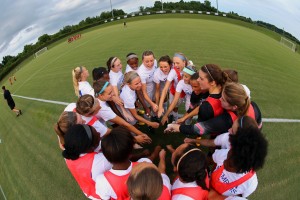The Center for Athletic Academic Services has recently announced that they have had “unprecedented success” in helping student-athletes achieve great scores in the classroom. Fall 2015 had some very impressive academic statistics, a few of them include being the 10th consecutive semester with students’ departmental GPA at 3.0 or above, with 15 out of 17 teams having a collective team GPA of 3.0 or above, and 41% of freshman athletes having a GPA of 3.5 or above. Especially impressive is the Women’s Soccer team, which had a 3.74 team GPA and the Men’s Tennis team, which had a 3.5 team GPA.
Tom Bowen, the Director of Athletics, says that “it is a culture that we have created here in Athletics, and the standards of excellence are our minimum standards for all that we do every single day.” He wants all of the University’s student-athletes “to become a true culture of champions, where every single student-athlete knows our standards and our expectations. They all have a shared focus, and are student-athlete community driven to be the best. Our goals are still not fully attained, and this fall academic success is just one aspect of our overall commitment for the 2015-2016 athletic year.”
A major contributor to the success of student-athletes at UM is the Center for Athletic Academic Services program. Through CAAS, student-athletes have access to comprehensive academic support services, including, but not limited to: intrusive advising, academic monitoring, academic mentoring, tutoring, structured study hall, and personal and professional development services through the PAWS program (Preparing Athletes for Winning Success). In addition, there is very close collaboration between the CAAS staff and athletic coaches, which strengthens the impact of CAAS’s services for the student-athletes. Coaches at UM also take great pride in recruiting the “right” type of student-athletes. By creating a culture of excellence in all areas, these young men and women, who not only want to compete at the highest level to win championships for our institution, but also want to prepare for life after sport.
Interestingly, there is a strong connection between better academics and better performance in sports. Bob Baker, Director of CAAS, says, “one example that represents that connection is the football program which has recently been winning on the field and in the classroom. The team had its highest team GPA in institutional history in spring 2015, and had 23 out of 23 student-athletes earn their degree during the 2014-15 year; that’s a 100% graduation rate for the year–a year in which they also won their first conference championship in a very long time.”
Part of CAAS’s success lies in its customized programming for each student. Some student-athletes have daily study hall and academic support appointments, while others have appointments twice per week or weekly appointments. CAAS also reaches out to faculty via the Retain program, electronically requesting progress reports twice each semester, and then works with coaches to ensure students are on the right track academically. Baker praises the coaches, “They do an amazing job at supporting the CAAS staff’s efforts to help their student-athletes.”
CAAS’s work is important in changing how athletics and academics are understood at the University level. Baker says that he and the CAAS staff “take pride in helping all student-athletes one way or another, consistently challenging all of our student-athletes to grow socially, academically and pre-professionally while they are here at the University of Memphis.”



